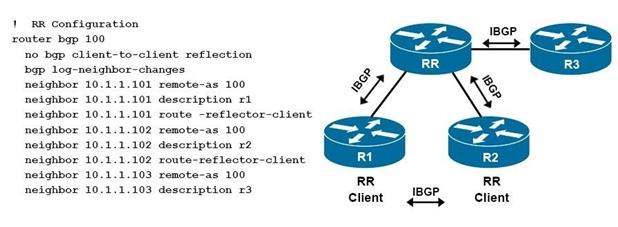Refer to the exhibit.

Which three statements correctly describe the route reflector’s behavior? (Choose three.)
A. The route reflector will not reflect routes from R3 to R1.
B. The route reflector will not reflect routes from R1 to R3.
C. The route reflector will reflect routes from R1 to R2.
D. The route reflector will reflect routes from R3 to R1.
E. The route reflector will reflect routes from R1 to R3.
F. The route reflector will not reflect routes from R1 to R2.


If the clients are really fully meshed and “a reflection” is basically disabled then C should not be correct. It seems like D,E and F are correct.
Original Answer of C,D,E is correct;
Client:Client = YES
Client:Non-client = YES
Non-client:Client = YES
Non-client:non-client = NO
A,B,F.
https://www.cisco.com/c/m/en_us/techdoc/dc/reference/cli/n5k/commands/client-to-client-reflection.html
By default, the clients of a route reflector are not required to be fully meshed and the routes from a client are reflected to other clients. However, if the clients are fully meshed, route reflection is not required. In this case, use the no client-to-client reflection command to disable client-to-client reflection.
no client-to-client reflection disables default behavior of RR to reflect routes because of full-mesh as been established between all the routers
How about non-client to client?
The v5.0 guide vol.2 says non-client route is reflected to client, vice versa.
(Sorry, I cound not find web document).
So, I agree with dara.
DEF is correct. F is explained by rdariolemes, but this command only effects the client to client reflection. It does not change the Reflection between RR Client and non-Client
correct number: DEF